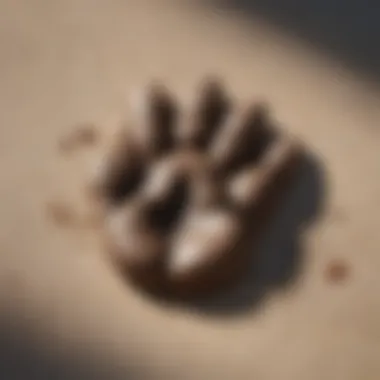Unveiling the Significance of Pet Loss Support Groups for Emotional Healing


Understanding Relationship Dynamics and Challenges
Navigating the emotional landscape after the loss of a pet can be tumultuous. Individuals often face a myriad of challenges in coping with the void left by their beloved animal companion. The bond between a pet and its owner can be profound, making the grieving process complex and overwhelming. It is essential to recognize and address these dynamics to embark on a journey of healing and acceptance.
Common Relationship Issues Faced by Men
Men experiencing the loss of a pet may encounter specific relationship challenges. Society's expectations around masculinity can hinder the expression of grief and emotional vulnerability. Men might find it difficult to articulate their feelings or seek support, leading to isolation and internal struggles. Understanding these common issues is crucial in fostering a supportive environment for grieving individuals.
Effective Communication Techniques
Communication plays a pivotal role in navigating grief and seeking support. Men often grapple with expressing their emotions openly, fearing judgment or perception of weakness. Learning effective communication techniques, such as active listening and assertive expression of feelings, can facilitate healthier coping mechanisms. By honing these skills, men can engage authentically with their emotions and connect with others on a deeper level.
Strategies for Resolving Conflict
In the aftermath of pet loss, individuals may find themselves grappling with internal conflicts and emotional turmoil. Strategies for addressing and resolving these conflicts are essential for emotional resilience and growth. Techniques such as mindfulness practices, cognitive reframing, and seeking professional guidance can aid in navigating these challenges effectively. By adopting proactive conflict resolution strategies, individuals can experience gradual healing and acceptance.
Personal Growth and Development
Embarking on a journey of personal growth and development post pet loss is instrumental in rebuilding resilience and well-being. By focusing on self-improvement, goal setting, and stress management, individuals can navigate grief constructively and cultivate a sense of purpose amidst loss.
Self-Improvement Tips for Men
Self-improvement is a catalyst for healing and growth. Men can explore avenues such as therapy, journaling, and engaging in creative pursuits to deepen self-awareness and emotional regulation. Fostering a growth mindset and investing in self-care practices are pivotal in promoting holistic well-being in the aftermath of pet loss.
Setting Goals and Achieving Success
Setting actionable goals post pet loss provides a sense of direction and purpose. Whether it involves embarking on new hobbies, pursuing career aspirations, or prioritizing mental health, goal setting empowers men to envision a fulfilling future amidst grief. By celebrating small victories and milestones, individuals can carve a path towards personal success and fulfillment.
Managing Stress and Wellness
Prioritizing stress management and holistic wellness is paramount in fostering emotional resilience. Men can explore various coping mechanisms, including exercise, mindfulness, and relaxation techniques, to combat the adverse effects of grief and loss. By cultivating a lifestyle that nurtures both physical and emotional well-being, individuals can navigate the challenges of pet loss with fortitude and grace.
Masculine Lifestyle Choices
Embracing a masculine lifestyle post pet loss entails focusing on aspects that promote self-care, style, and fitness. Men can explore grooming tips, fashion aesthetics, and health guidance to enhance their sense of self and well-being amidst grief.
Men's Fashion and Grooming Tips
Exploring fashion and grooming can serve as avenues for self-expression and confidence-building. Men can experiment with different styles, accessorizing techniques, and grooming practices to redefine their self-image post pet loss. By embracing personal style choices, individuals can project self-assurance and inner strength.
Health and Fitness Guidance
Prioritizing physical health and fitness post pet loss is pivotal in nurturing overall well-being. Men can engage in regular exercise routines, nutritional choices, and wellness practices to foster resilience and vitality. By committing to a lifestyle that prioritizes health, individuals can navigate grief with a renewed sense of vigor and balance.
Exploring Hobbies and Interests
Exploring hobbies and interests can be a source of solace and rejuvenation post pet loss. Men can delve into activities such as sports, crafts, or outdoor pursuits to engage creatively and emotionally. By immersing themselves in fulfilling pastimes, individuals can foster positive distractions and cultivate new avenues of joy amidst grief.
Building Strong Connections
Nurturing connections and relationships is integral to the healing process post pet loss. Building strong friendships, cultivating romantic bonds, and honing networking skills can create a support system that fosters emotional growth and resilience.
Strengthening Friendships and Social Circles


Maintaining friendships and social circles post pet loss is essential in combatting isolation and sorrow. Men can prioritize quality time with friends, engaging in meaningful conversations and shared activities to bolster emotional well-being. By nurturing genuine connections, individuals can feel supported and understood in their grieving journey.
Nurturing Romantic Relationships
Nurturing romantic relationships post pet loss entails open communication, vulnerability, and mutual support. Men can lean on their partners for emotional solace, understanding, and companionship during times of grief. By fostering a strong and empathetic bond with their significant others, individuals can navigate loss together with resilience and shared intimacy.
Effective Networking Techniques
Effective networking can expand social circles and professional opportunities post pet loss. Men can leverage networking events, online platforms, and community engagements to foster meaningful connections and collaborations. By honing networking skills and building authentic relationships, individuals can garner support, guidance, and potential avenues for personal and professional growth.
Enhancing Emotional Intelligence
Enhancing emotional intelligence post pet loss involves understanding, regulating emotions, and cultivating empathy in relationships. By developing healthy boundaries and fostering compassionate interactions, men can navigate grief with emotional acuity and resilience.
Understanding and Regulating Emotions
Understanding one's emotions and practicing emotional regulation post pet loss is crucial in maintaining mental well-being. Men can explore mindfulness practices, therapy, and self-reflection to deepen their emotional intelligence and response to grief. By acknowledging and processing emotions, individuals can embark on a journey of healing and acceptance.
Empathy and Compassion in Relationships
Embracing empathy and compassion in relationships post pet loss fosters deeper connections and understanding. Men can practice active listening, validation, and supportive behaviors to nurture meaningful interactions with loved ones. By demonstrating empathy and compassion, individuals can cultivate a support system that provides solace and comfort throughout the grieving process.
Cultivating Healthy Boundaries
Cultivating healthy boundaries post pet loss is essential in safeguarding emotional well-being and fostering self-respect. Men can assert their needs, set limits, and communicate boundaries in relationships to preserve mental health and reduce emotional strain. By advocating for self-care and personal boundaries, individuals can navigate grief with strength and self-assurance.
Understanding the Emotional Toll of Pet Loss
Pet loss can evoke profound emotional responses, making it imperative to address and understand the complexities of this experience. This section aims to delve into the deep emotional impact of losing a pet, shedding light on the significance of processing grief and seeking support. By exploring the intricacies of pet loss, individuals can navigate this challenging emotional journey with more clarity and resilience.
Grief and Bereavement
Acknowledging the Depth of Emotions
Acknowledging the depth of emotions in pet loss involves recognizing the intense feelings of sorrow, loneliness, and even guilt that may arise. This aspect is crucial as it allows individuals to confront their emotions openly and begin the healing process effectively. By acknowledging these complex emotions, individuals can take the first step towards coming to terms with their loss and seeking support from others who understand their feelings.
Navigating the Stages of Grief
Navigating the stages of grief entails moving through the various emotional phases that accompany loss, including denial, anger, bargaining, depression, and eventually acceptance. Understanding and navigating these stages is vital in comprehending the grieving process and finding ways to cope with the intense emotions that arise. Each stage offers unique challenges and opportunities for growth, highlighting the need for a supportive environment where individuals can process their feelings and receive validation.
Impact on Mental Well-being
The impact of pet loss on mental well-being can be profound, affecting one's overall emotional health and stability. Coping with the loss of a beloved pet can lead to feelings of emptiness, anxiety, and even depression. Addressing this impact is essential in promoting mental wellness and resilience during the grieving process. By acknowledging and addressing the implications of pet loss on mental well-being, individuals can take proactive steps towards healing and emotional restoration.
Attachment and Loss
Bonding with Pets
Bonding with pets involves forming deep emotional connections built on trust, companionship, and unconditional love. The bond between a pet and their owner is often characterized by loyalty and mutual understanding, creating a profound sense of companionship and comfort. This connection contributes significantly to one's emotional well-being, making the loss of a pet particularly poignant and challenging.
Loss of Companionship
Experiencing the loss of companionship with a pet can trigger feelings of loneliness and isolation, disrupting daily routines and emotional stability. Pets often serve as constant sources of companionship, offering unconditional love, support, and a sense of belonging. Coping with the absence of this companionship requires individuals to navigate feelings of grief and longing, highlighting the importance of seeking support and understanding during this difficult time.
Understanding Attachment


Understanding attachment to a pet involves recognizing the emotional bond and sense of attachment that develops between owners and their animals. This attachment is characterized by deep affection, shared experiences, and a strong sense of responsibility towards the well-being of the pet. Acknowledging the depth of this attachment is crucial in comprehending the impact of pet loss on one's emotional state and overall well-being. By understanding the nature of attachment, individuals can navigate their grief more effectively and engage in healthy coping mechanisms throughout the healing process.
Importance of Support Networks
Support networks play a crucial role in providing solace and assistance to individuals experiencing the loss of a pet. In this article, the significance of support networks is highlighted extensively. These networks serve as pillars of comfort and understanding during times of grief and bereavement. By offering a non-judgmental space for individuals to express their emotions openly, support networks contribute immensely to the healing process. They validate the deep bond shared between humans and their animal companions, acknowledging the profound impact of such relationships on one's mental well-being and overall quality of life.
Role of Support Groups
Providing Emotional Comfort
Providing emotional comfort is a fundamental aspect of support groups for pet loss. This key characteristic allows individuals to feel understood and supported, fostering a sense of belonging and connection. The unique feature of emotional comfort lies in its ability to alleviate feelings of loneliness and isolation commonly experienced after the loss of a beloved pet. The comfort offered by support groups acts as a source of strength and resilience, aiding participants in navigating through their grief with compassion and empathy.
Sharing Experiences
Sharing experiences within a support group setting promotes empathy and camaraderie among members. This key characteristic enables individuals to bond over common emotions and challenges related to pet loss. The unique feature of shared experiences lies in its power to normalize feelings of grief and sorrow, reassuring participants that their emotions are valid and shared by others in similar circumstances. By sharing stories and reflections, group members find solace in knowing that they are not alone in their journey of healing and acceptance.
Offering Validation
Offering validation is integral to the support group dynamic, providing reassurance and affirmation to individuals processing their grief. This key characteristic validates the unique bond between a person and their pet, acknowledging the profound impact of this relationship on the individual's life. The unique feature of validation lies in its ability to counteract self-doubt and guilt often associated with pet loss, offering a sense of validation and acceptance for one's emotional responses and coping mechanisms.
Professional Guidance
Therapeutic Benefits
The therapeutic benefits of support groups for pet loss are invaluable in promoting emotional healing and resilience. This key characteristic emphasizes the role of group therapy in facilitating cathartic experiences and emotional expression. The unique feature of therapeutic benefits lies in its ability to provide a structured environment for individuals to process their grief constructively, enhancing coping mechanisms and promoting psychological well-being.
Counseling Services
Access to counseling services within support groups offers individuals tailored emotional support and guidance. This key characteristic ensures that participants have access to professional mental health resources and interventions to address their specific needs. The unique feature of counseling services lies in its personalized approach to grief support, offering individualized strategies for coping and emotional healing.
Expert Advice
Expert advice within support groups equips participants with practical insights and strategies for navigating the complexities of pet loss. This key characteristic emphasizes the importance of professional guidance in addressing the multifaceted emotional challenges associated with grief. The unique feature of expert advice lies in its evidence-based approach to emotional support, incorporating best practices and therapeutic techniques to empower individuals in their healing journey.
Joining a Support Group
Joining a support group after experiencing the loss of a beloved pet can be a pivotal step in the healing process. These groups provide a safe space for individuals to share their stories, emotions, and struggles, knowing that others in the group understand and resonate with their pain. By joining a support group, individuals not only receive emotional comfort but also feel less isolated in their grief journey. Being part of a support network can offer validation, empathy, and a sense of community that is crucial for navigating the complex emotions that arise from pet loss.
Finding a Suitable Group
Researching Options
Researching different support group options is essential to finding the most suitable fit for one's needs. Whether online or in-person, understanding the structure, focus, and dynamics of each group can help individuals determine where they are likely to receive the most effective support. Online groups offer convenience and accessibility, while in-person groups provide face-to-face interaction and a more intimate setting. It is important to consider the platform that aligns best with one's comfort level and communication preference.
Online vs. In-Person Groups
Comparing online and in-person support groups allows individuals to weigh the pros and cons of each format. Online groups offer flexibility and anonymity, ideal for those who may feel uncomfortable sharing their emotions face-to-face. On the other hand, in-person groups foster a more immediate connection and deeper sense of camaraderie. Deciding between the two depends on personal comfort levels and the desired level of interaction with fellow group members.
Compatibility with Needs
Finding a support group that aligns with one's specific needs is crucial for ensuring that the experience is beneficial and supportive. Considerations such as group size, facilitator experience, and focus areas of discussion play a significant role in determining compatibility. It is important to join a group where individuals feel understood, respected, and valued, creating a conducive environment for healing and growth.
Participating in Group Sessions
Sharing Stories


Sharing personal stories within a support group setting can be cathartic and validating. By expressing their grief, memories, and challenges, individuals not only unburden themselves but also contribute to the collective healing process. Listening to others' experiences can foster a sense of connection and mutual understanding, instilling a feeling of unity and solidarity among group members.
Engaging in Discussions
Engaging actively in group discussions allows individuals to explore their emotions, gain insights, and receive feedback from peers. The exchange of perspectives, coping strategies, and coping mechanisms can provide new ways of processing grief and navigating the path towards healing. Engaging in discussions fosters resilience, empathy, and a supportive network that empowers individuals to cope with loss.
Receiving Support
Receiving support from fellow group members and professional facilitators is a cornerstone of the healing journey within a support group. Acknowledging one's vulnerabilities, seeking guidance, and accepting assistance from others can be transformative in the grieving process. By being open to receiving support, individuals cultivate trust, openness, and emotional well-being, creating a nurturing environment for personal growth and healing.
Building a Supportive Network
Forming Connections
Forming meaningful connections with others in a support group establishes a foundation of support, understanding, and companionship. Building relationships based on shared experiences, empathy, and compassion creates a network of individuals who uplift and encourage each other. Forming connections within a supportive environment fosters trust, emotional safety, and a sense of belonging that is invaluable in navigating grief and loss.
Creating Bonds
Creating lasting bonds with those who have walked a similar path of pet loss can lead to profound healing and transformation. Developing bonds based on shared stories, mutual respect, and vulnerability nurtures deep connections that transcend the grief journey. These bonds serve as pillars of strength, solace, and support, offering comfort and reassurance during moments of sorrow and struggle.
Fostering Empathy
Fostering empathy within a support network cultivates a culture of compassion, understanding, and acceptance. By empathizing with others' pain, individuals in the group create a space of non-judgment, kindness, and validation. Fostering empathy enhances emotional connections, builds resilience, and encourages a spirit of mutual care and solidarity that is essential for healing and growth.
Benefits of Seeking Support
Seeking support after experiencing the loss of a pet is crucial for emotional well-being. Grieving pet owners often find solace and understanding in support groups where they can share their emotions without judgment. These groups offer a safe space for individuals to express their feelings of loss and sadness openly. By participating in these networks, individuals can gain insights and coping strategies from others who have gone through similar experiences. Moreover, seeking support can aid in the healing process by providing a sense of community and empathy.
Emotional Healing
Coping Strategies: Coping strategies play a vital role in navigating the emotional turmoil following pet loss. These strategies encompass various techniques, such as journaling, mindfulness practices, and seeking professional therapy. By utilizing coping strategies, individuals can manage their grief more effectively and develop resilience in coping with their emotions.
Healing Processes: Healing processes after losing a pet involve acknowledging the pain, accepting the loss, and gradually finding ways to commemorate the pet's memory. These processes are essential for moving forward and processing the emotions associated with grief. Engaging in healing activities, such as creating a memorial or participating in rituals, can provide comfort and closure.
Embracing Memories: Embracing memories of a beloved pet can be a therapeutic way to honor their legacy. Reflecting on happy moments shared with the pet and creating keepsakes can help individuals cherish the memories and find peace amidst the grief. Embracing memories allows individuals to focus on the positive impact their pet had on their lives, fostering a sense of gratitude and acceptance.
Psychological Well-being
Reducing Isolation: One of the key aspects of seeking support is reducing the sense of isolation that often accompanies pet loss. By connecting with others who understand their feelings, individuals can alleviate feelings of loneliness and seclusion. Being part of a support group can create a sense of belonging and comfort, reducing the psychological impact of isolation.
Improving Resilience: Building resilience is a critical component of psychological well-being after experiencing loss. By facing and processing grief within a supportive environment, individuals can enhance their capacity to bounce back from adversity. Strengthening resilience through support networks helps individuals develop healthy coping mechanisms and adaptability in the face of challenges.
Enhancing Coping Mechanisms: Seeking support also aids in enhancing coping mechanisms for dealing with grief. Learning effective coping strategies, such as seeking professional counseling or engaging in self-care practices, can improve emotional regulation and overall well-being. Developing healthy coping mechanisms enables individuals to navigate grief more effectively and rebuild their sense of stability and hope.
Conclusion
In concluding our exploration of support groups for the loss of a pet, it is imperative to underscore the profound significance of this topic within the broader context of coping with grief and loss. Support groups play a crucial role in aiding individuals through the challenging process of mourning a beloved animal companion. By offering a safe space for individuals to share their experiences, emotions, and memories, these groups serve as a beacon of solace in times of profound sadness and emotional upheaval. Moreover, support groups foster a sense of community and understanding among participants, encouraging healing and growth in the face of profound loss. Through the act of coming together to commemorate the cherished pets we have lost, these groups help individuals navigate the complexities of grief, honor their pet legacies, and find hope in the midst of despair. Overall, the role of support groups in addressing pet loss cannot be overstated, as they provide a vital lifeline for those in need of empathy, connection, and healing.
Moving Forward
Accepting Support
Accepting support is a pivotal aspect of the grieving process and plays a fundamental role in the overall journey of healing from the loss of a pet. By acknowledging the need for support from others who understand their pain, individuals can cultivate resilience and emotional strength as they navigate the depths of their grief. Accepting support fosters a sense of validation and understanding, reducing feelings of isolation and loneliness that often accompany pet loss. It allows individuals to lean on others for comfort, guidance, and companionship, creating a network of care and compassion that can be instrumental in the healing process.
Honoring Pet Legacies
Honoring pet legacies is a heartfelt way to commemorate the lives of our furry companions who have passed on. By celebrating the memories, joy, and love shared with our pets, we pay tribute to the unique bond we formed with them. This act of honoring pet legacies honors the significance of our pets in our lives and perpetuates their legacy through stories, photos, and cherished keepsakes. It serves as a healing balm for the soul, allowing individuals to embrace the beauty of the time spent with their pets and find solace in the enduring impact they continue to have on their lives.
Finding Hope
Finding hope amidst the darkness of pet loss is a beacon of light that guides individuals through their mourning journey. Hope instills a sense of purpose and optimism, reminding individuals that joy and healing can coexist with grief. By cultivating a mindset of hopefulness, individuals can channel their pain into positive energy, embracing the memories of their pets with gratitude and resilience. Finding hope enables individuals to see beyond their current sorrow, envisioning a future filled with new beginnings, growth, and the eternal presence of their beloved pets in their hearts.



